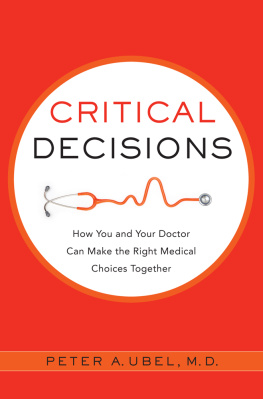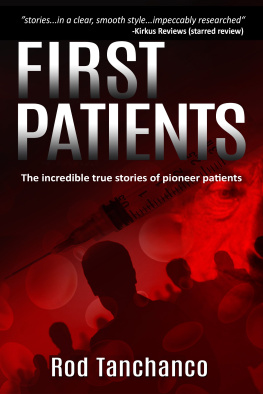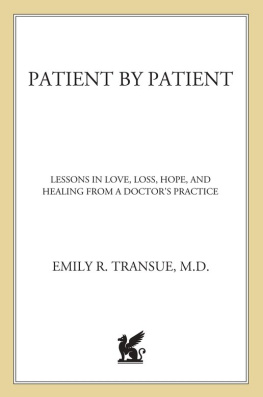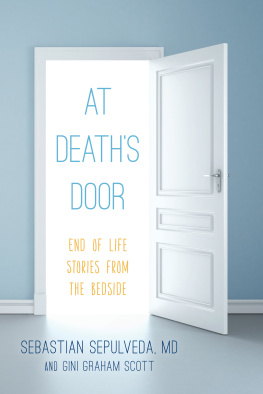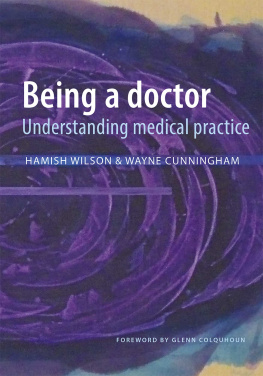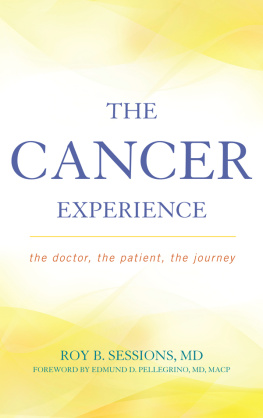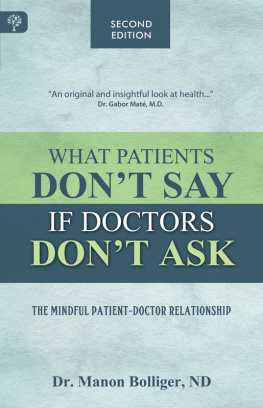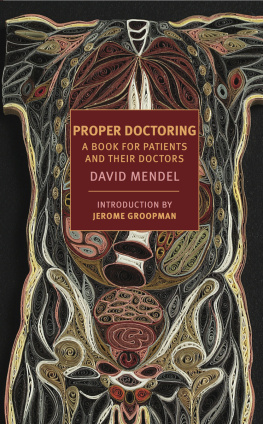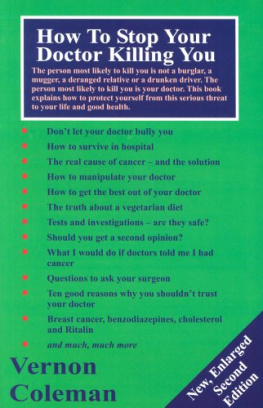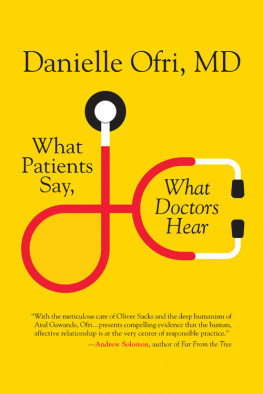
For Paula
Contents
In the old days, Fred Furelli wouldnt have been allowed to feel so miserably unsure of his decision. His doctor would have made the decision for him. But now he lay in bed at night worried and bewildered. The urologist had told him he had early-stage prostate cancer, and the tumor could be cured with either surgery or radiation, orand this was hard to fathomhe could do nothing, wait to see if the cancer grows.
He contemplated his options. The urologist had laid out a slew of information on what surgery would feel like, but in the aftermath of learning he had cancer, that information was a blur. The urologist had not discussed radiation as thoroughly as surgery. Was this a sign that it wasnt a viable option? As for the third option, he was still perplexed that a cancer could be bad enough to warrant an operation yet mild enough to address with watchful waiting. Things werent adding up.
So he came to me for advice.
I was Mr. Furellis primary care internist, and we had known each other for half a decade. (Like all the patients in this book, Furellis name is a pseudonym.) I had seen his pathology report as well as his urologists assessment of his condition. His cancer was small and hadnt traveled beyond the prostate gland. Furelli was in his early seventies, which meant there was a decent chance his tiny cancer would smolder for years without affecting his health. Hence the option of watchful waiting. With this approach, the urologist would test his blood at regular intervals to see if his cancer was growing fast enough to threaten his health, at which point we would reconsider the risks and benefits of more aggressive approaches.
But not everyone is comfortable waiting around while an alien-like presence grows inside him. Watchful waiting feels too passive for some men. (Some urologists have even renamed this approach active surveillance to overcome this perception.) More aggressive treatments, howeversuch as surgery and radiationare not benign little procedures. The vast majority of men receiving these treatments experience impotence and urinary incontinence. In other words, patients recover from these arduous treatments only to discover that they have trouble with erections and need to wear adult diapers.
My patient was completely torn. He didnt like the idea of going through a painful treatment, nor of suffering from treatment complications. But he wasnt crazy about doing nothing either, as he put it to me. Thats the reason he asked for my advice.
Its also the reason I wrote this book, to lay out the dilemma I faced that day: whether I should give him advice or leave him to make up his own mind. I took care of Mr. Furelli in the mid- to late 1990s, two decades into the patient-empowerment revolution. Prior to the revolution, medical decisions werent shared affairs. Doctors made decisions and patients largely obeyed. Indeed, physicians had dominated medical decision making for the better part of two millennia, from the time of Hippocrates through the dawn of medical science in the twentieth century straight up until the mid-1970s, when the traditions of medical decision making ran head-on into patients (and lawyers and a new breed of people called ethicists) who demanded that doctors involve patients more actively in their decisions.
I was quite aware of the revolution as I cared for Mr. Furelli. At the time, you see, I was an assistant professor of medicine at the University of Pennsylvania and one of the founding faculty members of that schools Center for Bioethics. A philosophy major as an undergrad, I had studied bioethics at the University of Chicago after completing my medical training. Im not spouting off my CV to impress you but to explain where I was coming from on that day. I was a new breed of physician. Swept up by the moral momentum of the revolution, I was determined to be the kind of doctor who didnt boss around his patients. I wouldnt tell patients what to do; Id help patients make their own decisions.
In the prerevolutionary days of physician paternalism, this patients urologist would have told him that he had a small growth in his prostate and needed surgery. Or, if the surgeon felt that the patient was too frail to benefit from surgery, he would have withheld information about the tumor and monitored it without the patients knowledge. As the word paternalism suggests, the old days were modeled on parentchild relationships, with the doctor acting as the all-powerful and knowing parent, benevolently protecting the childlike patient from worry and responsibility. If the patient were deemed too fragile for bad news, the doctor would turn to euphemism or out-and-out evasion. The tumor would be described as an X-ray shadow or an infection. In those days, doctors made the decisions and patients were expected to follow their orders.
Back then, this gentleman would not have lain awake at night wondering what to do. But today Mr. Furelli was torn asunder by indecision and came to me looking for help.
What would you do if you had this cancer? he asked me.
New Age doctor that I was, I threw him back into his pool of indecision. This is your decision to make.
He looked confused.
Let me try an example, I said. What are you going to watch on TV tonight?
The hockey game, he responded, an altogether unsurprising response given the Philadelphia Flyers hat perched on his balding head.
Bad decision, I shot back. You should watch the figure-skating competition on channel 19 instead.
He looked at me incredulously. But I dont like figure skating.
Exactly! I exclaimed. I cant tell you what to watch on TV tonight because the right choice depends on your preferences. The same thing goes for your prostate cancer.
My bioethics training had taught me that the best choice is often not merely a medical decision but instead hinges on a patients values. The best choice for this patient, in fact, depended on how important he felt it was to avoid treatment complications, such as urinary incontinence, versus how he felt about the prospect of living with an untreated cancer. Steeped in bioethical theories, I had brilliantly taught this patient the difference between facts and values, the distinction between medical judgments and patients rights.
Mr. Furelli seemed to understand my point. He looked at me with a knowing glance and said, Okay, Doc. What would you do if you were me?
My brilliant analogy hadnt empowered him as much as I had expected.
I SHOULD HAVE KNOWN BETTER
I should have known better than to foist this decision upon my reluctant patient. By that time I had been practicing medicine for about a decade, and Id had hundreds of patients ask me for my medical advice: What should I do, Doc? or What would you do if it were your mother, Doctor? These requests, and a dozen similar variations, had become daily invitations for me to impart my supposed wisdom upon grateful patients, wisdom that was not limited to medical knowledge. I didnt just help people figure out which pill would control their blood pressure with the fewest side effects. I was helping men figure out how to tell their spouses theyd caught herpes. I found myself imparting marital advice before I was married, childrearing tips before Id had children, and end-of-life guidance before any of my close friends or relatives had died.
Id come to learn that patients dont want their doctors to simply toss medical information at them and let them figure out what to do. So I should have known better than to believe a figure-skating analogy would suddenly empower my patient to become an independent decision maker. Rightly or wrongly, many patients value their doctors advice and indeed rely on such advice when they are overwhelmed by the situation at hand. I expect many readers would react the same as Furelli, looking for guidance and advice in a time of need, not seeking to establish decision-making authority. In turning the decision back on Mr. Furelli with my skating analogy, Id come face-to-face with the myth of patient empowerment. Mr. Furelli had been educated about his treatment alternatives and about the importance of his values in making the right decision, but all this information and freedom of choice didnt leave him feeling very empowered. Leaders of the patient-empowerment revolution had fought a battle in favor of patient autonomy over physician paternalism. Disgusted by the way physicians dominated medical decision making, they had worked to make patients into the decision makers, thereby relegating physicians to the role of information providers. Jerome Groopman espoused this view in an interview on The Colbert Report . In his inimitable manner, Colbert had asked Groopman who really ought to make medical decisions: Are you saying that I get to decide on my treatment? Why did you go to medical school? Groopman responded to Colbert much the way I had tried to respond to Mr. Furelli that day: I went to medical school to help you understand the risks and benefits as an individual, so you can put your values into the decision.
Next page
